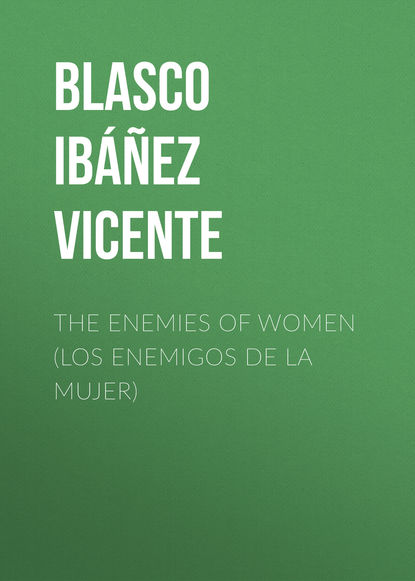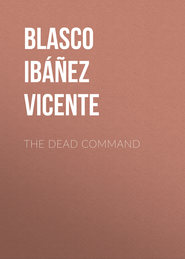По всем вопросам обращайтесь на: info@litportal.ru
(©) 2003-2024.
✖
The Enemies of Women (Los enemigos de la mujer)
Настройки чтения
Размер шрифта
Высота строк
Поля
When the Paris architects had carried out the orders of the Princess, the family left the castle they were occupying in the vicinity of London. A group of rich Parisians, Jewish bankers for the most part, were covering the level grounds around the new Park Monçeau, with large private dwellings. The Princess Lubimoff had an enormous palace, with a garden of extraordinary size for a city, built in this quarter. She even set up a tiny dairy behind a grove of trees, and without leaving her place she could enjoy the rôle of a country woman, whipping cream and churning butter, in imitation of Marie Antoinette, who likewise played at being a shepherdess in the Petit Trianon.
At times a wave of tenderness swept over her, and she adored and obeyed her husband, pushing her humility to extremes that were alarming. She told her visitors about the General's campaigns, and his daring exploits back in Spain, a land which inspired in her a romantic interest, and which for that very reason she did not care ever to see. Suddenly she would cut her eulogies short with a command:
"Marquis, show them your wounds."
As proof of her tenderness, she refrained from getting angry when her husband refused.
She always called him "Marquis," perhaps in order to keep the princely title for herself alone, perhaps because she felt that he should not be deprived of a rank he had gained with his blood. The Marquis never paid any attention to this breach of etiquette. His wife had already committed so many!
A year after their marriage, when the news reached London that Alexander II had been killed by the explosion of a Nihilist bomb, the Princess ran about her apartments like a mad woman, and took to her bed after an extraordinary fit of anger.
"The wretches! He was so good!.. They've killed their own father."
And thereafter when Saldaña entered the luxurious dwelling in Paris, he often came across strange visitors, at whom the lackeys in breeches stared in amazement. They were uncouth girls with spectacles, and cropped hair, carrying portfolios under their arms; men with long hair and tangled beards, whose eyes contained the startled expression of visionaries; Russians from the Latin Quarter under police surveillance, terrorists, who appealed not in vain to the generosity of the Princess, and used her money perhaps to make infernal machines which they sent back to their country and hers.
When the Prince Michael Fedor recalled his childhood memories, he could see his father holding him on his knees and caressing him with his firm hands. The child would gaze up at the dark face and large mustache that joined Saldaña's closely cropped mutton chop whiskers. He could not be sure whether the moisture in those black, commanding eyes came from tears; but after he learned Spanish he was sure that the Marquis had often murmured, as he smoothed the tiny brow:
"My poor little boy!.. Your mother is mad!"
When Michael reached the age of eight, the problem of his education caused the Princess to show her motherly concern for a few weeks. One of those visitors, who so greatly worried the servants, brought his books and his frayed garments from a narrow street near the Pantheon, and took up his abode in the lordly dwelling of the Lubimoffs. He was a silent young man, given to the study of chemistry, and forbidden to return to his country. The very day of his arrival, a secret service agent came and questioned the porter of the palace.
"I want my son to know Russian," said the Princess. "Besides, he will learn a great deal from Sergueff. Sergueff is a real man of learning, and worthy of a better fate."
Saldaña insisted that he should likewise have a Spanish teacher, and she raised no objections. All the members of her family had possessed to an unusual degree the talent of the Slavs for learning languages easily.
"Prince Michael Fedor," said his mother, "is the Marquis of Villablanca, and ought to know the language of his second country."
On this account the General once again sought out his former companions in arms who were still scattered in various parts of Paris. The fame of his enormous wealth had brought him many requests, even from persons of whom he had formerly stood in awe. But although the Princess, who was generous to a fault, allowed him the management of her fortune, Saldaña, with chivalrous unyielding integrity, felt that he had no right to her money, and gradually came to avoid the insistent suppliants. Besides, a great change had come over this silent man during his travels through Europe. The former soldier of the absolute monarchy was now an admirer of England and her constitutional history.
"You see things differently when you travel about," was all he said. "If all my fellow countrymen had only seen the world."
One day the new teacher presented himself at the palace. He was twelve years younger than Saldaña. He had been under the latter's command toward the end of the war, and instead of calling him by his title of Marquis or Prince he addressed him proudly, at every opportunity, as "my General."
The General had not the slightest recollection of him; but the fact that he could give exact details of the last campaign, and had been recommended by various friends, did not permit of any doubt as to his veracity. He must have been one of those lads who had run away from home and joined the Carlist bands, making up those forces of irregulars whom Saldaña, unable to tolerate their frequent atrocities, more than once threatened with execution en masse. The teacher claimed that the General himself had given him a subordinate's commission in the last months of the war, owing to his having a better education than his ragged comrades.
Thus Marcos Toledo entered the palace of the Lubimoffs.
The solemn husband of the Princess laughed with boyish glee upon hearing the story of Toledo's first experiences as an emigré in Paris.
During the first few months, since he did not know French, he used to stop the priests in the street, to talk with them in Latin. He eked out a miserable existence, giving lessons on the guitar, and lecturing in a Polyglot Institute, where the auditors did not pay the slightest attention to the subjects discussed, but tried simply to accustom their ears to his Spanish pronunciation.
Seven francs and a half, for talking an hour and a half! But Toledo made up for the smallness of the compensation in the pleasure it gave him to orate about the happy days of Philip II, so much superior to "these days of liberalism."
"At present, I have only one ambition, General," he ended by saying, "and that is to dress well."
The passion for luxurious display came from his youthful days as a guerrilla, when he would steal red and yellow petticoats from peasant women in order to make uniforms for himself. In Paris, he did not feel so keenly the lack of nutritious food, as he did the fact that he was obliged to wear clothes that did not belong to any known fashion.
When he was given quarters on the top floor of the palace, like the Russian teacher, and the General had selected various garments for him from his large wardrobe, Toledo felt he had realized all the dreams that he had elaborated while running about Paris as a persistent agent for a thousand unsaleable things.
His fellow countrymen, former comrades in poverty, admired him on seeing him all dressed up like a rich man, and often riding in the carriage of a Prince. It scarcely seemed honorable that he, a former fighter, should occupy a position as a teacher, and he used to say in an apologetic manner:
"I am now General Saldaña's aide-de-camp. I don't think it will be long before we take to the mountains again."
Young Prince Michael admired his Russian teacher, because his mother affirmed that he was a great scholar. The boy felt a certain fear in the presence of this melancholy sage. On the other hand, Michael Fedor treated the Spaniard with an air of friendly and patronizing superiority. Toledo made his father laugh, and that was enough to cause the son to consider him an inferior being, but one worthy of esteem nevertheless, because of his docility and patience.
"Say: is it true that you were going to be a priest?" Michael Fedor used to ask Toledo. "Is it true that after you left the seminary you were a druggist's clerk?"
"Prince," the teacher replied with dignity, "I am Don Marcos de Toledo. My name tells my nobility, in spite of everything that envious people may say, and I have a right to use the 'Don' since I am an officer and your father, the Marquis, gave me my commission."
In a short time the pupil was speaking Spanish correctly. It seemed that he had learned it as rapidly as possible in order to be better able to poke fun at his hidalgo teacher.
The father also contributed to the education of the heir of the Lubimoffs the one thing he was able to teach. Every morning, after the lessons given by the Russian, which left the little fellow with a solemn face, Saldaña would wait for him in a large room on the ground floor.
"Prince, on guard!"
And he, who had been the best blade in the Carlist army, and had on his conscience the slashing of a skull to the jawbone in a duel during the Turkish campaign, smiled proudly when he saw how this eleven year old boy stood his ground during the fencing lesson, parrying the hard blows and returning them successfully at the least unguardedness on his father's part. Michael Fedor was going to be a splendid fighting man, a worthy descendant of the Cossack of Russia, and of the guerrilla of the Spanish mountains.
But Saldaña was not to enjoy this satisfaction for long. Among his various "lucky wounds," which only bothered him slightly with the changing of the seasons, there was one which from time to time inflicted periods of acute pain. For many years he had carried in his body a Spanish bullet which the sawbones of his guerrilla band had been unable to extract. When the surgeons of London and Paris attempted the operation it was too late.
One morning the General's valet, on entering the room, found him dead.
Michael Fedor never forgot the sorrow he had felt on that occasion, nor the sumptuous funeral which the Princess had ordered, equal to that of a king deceased in exile. But what he remembered most clearly was the extraordinary grief of his mother. She too wanted to die. Her Russian maids were once obliged to snatch from her hands a phial of laudanum, receiving for their pains a few more blows than usual. Then, with her hair streaming down her back, she ran about wailing like a madwoman in front of all the portraits of the General. Oh! Her hero! Now she really knew how much she loved him…
For several months she received her visitors in a drawing room with black furnishings and curtains. Wearing loose mourning garments, she half reclined on a sofa in front of a full length portrait of Saldaña. His swords, his uniforms, and even a Russian saddle were on exhibition in the drawing room, which had been converted into a sort of museum of the deceased.
"He died like the man he was!" moaned the widow. "He was killed by his wounds."
At this period began the ultimate stage in the rise of Don Marcos Toledo. The Russian scholar receded into the background. A part of the dead man's glory passed to his humble fellow countryman who had witnessed his great exploits. One evening, the Princess, while engaged in conversation in the drawing room museum with some noble relatives who had arrived from Russia, wept so copiously at the memory of her husband, that she decided to leave the room for a moment.
"Colonel, your arm."
Toledo was present in company with his pupil, and looked around with an expression of bewilderment. The Princess had to repeat her command in a more imperious voice. "Colonel, your arm!" She was speaking to him! For some time Don Marcos thought that the new title was a whim of the Princess and that some day when he was least expecting it his commission as "Colonel" would be withdrawn.
But when the first months of mourning had passed and the widow, tiring of solitude, started to resume her social calls, she insisted on being accompanied by Toledo, and on introducing him to her acquaintances in the aristocratic world.
"He is the aide-de-camp of the dead Marquis," she explained.
The very title he had invented to give himself an air of importance in the eyes of his half-starved companions in poverty! Toledo no longer questioned the validity of his promotion. Now that the Princess was presenting him as her husband's aide-de-camp, he might well be a Colonel. And a Colonel he was, even for the young Prince, who at first had given him the title to make fun of him, but finally came to call him "Colonel" by force of habit.
Toledo's dreams of splendid and showy toggery were now realized magnificently. With the Princess he did not need to fear the scruples sometimes shown by Saldaña, who hated extravagance and mismanagement. The great lady even felt disdain for those who were niggardly in availing themselves of her generosity. Don Marcos was enabled to change his attire several times a day, and held long conferences with famous tailors. He sought personal elegance. He wished to dress like a gentleman of distinction, but at the same time to wear clothes of a cut that would plainly show that he was accustomed to uniforms: He had in mind something like a Napoleonic Marshal obliged to wear a dress suit. Through his barber, likewise, he effected a great transformation. He imitated the manner in which the General had worn his hair, with a part that started at his forehead and ended at the back of his neck, and with stray locks hanging down at the temples. His mustache was taught to mingle with his side whiskers, in the Russian fashion. In accompanying the Princess, he learned to kiss ladies' hands with the grace and ease of an old courtier. He also learned to carry on long conversations without saying anything, to keep himself in the background, practically unseen, while his superiors were talking.
When the Princess, after the first year of mourning, resolutely returned to her box at the Opera, Don Marcos attended her, remaining discreetly in the rear, like the Chamberlain of a Queen. One evening, during an intermission, on passing to the front of her box, the Princess heard the Colonel telling an old French general, a friend of the house, about the battle of Villablanca.
"And the Marquis said to me: 'Now it's your chance, Toledo: Let's see how you can make out with a bayonet charge.' So I bared my sword, and at the head of my regiment…"
"He's a true soldier," interrupted the Princess, "a worthy companion of my hero… The Marquis often talked to me about him."
And at that moment she was really sure she had heard the silent Saldaña relate the gallant deeds of his aide-de-camp.















